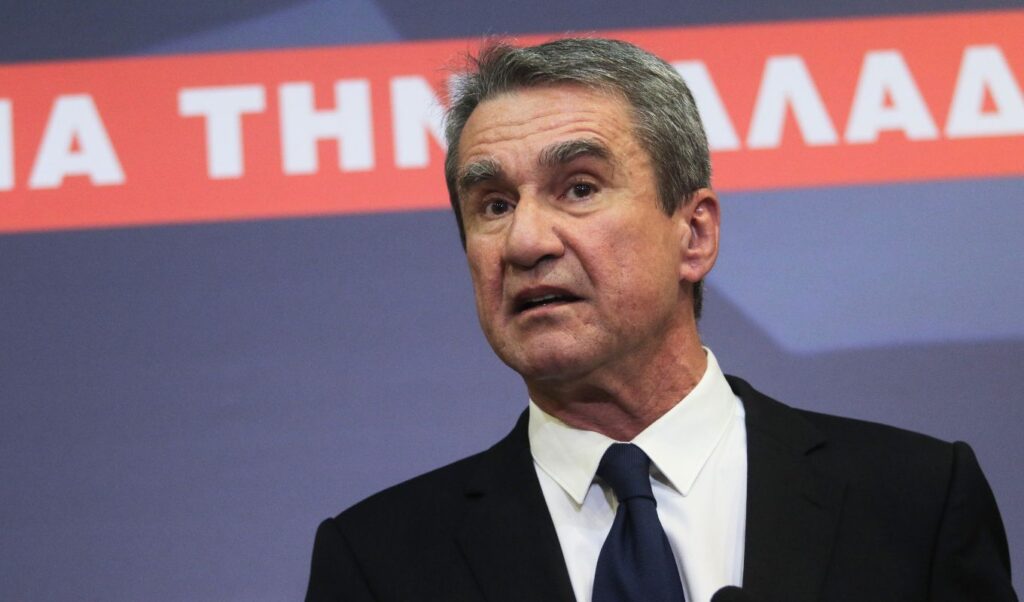Constitutional law expert and former minister Andreas Loverdos referred to the constitutional objection that PASOK filed against the amendment submitted to Parliament regarding the Tomb of the Unknown Soldier. “On many issues they took positions on – non-state non-profit universities, postal voting, changes to criminal codes – I couldn’t support what they were saying, which is why I opposed them. But this I would never swallow. This issue with the Unknown Soldier I would never swallow. This is absolutely unacceptable. To be unable to say that I respect this and that all other rights are exercised freely just one meter away,” Loverdos said speaking today on ERTnews Radio 105.8.
Loverdos: No assembly was banned
Andreas Loverdos then emphasized: “I haven’t changed. What I believed I still believe and what I said I still say. Those I left behind have changed.” “I’m referring to the political position they took, most characteristically, in Parliament. The party expressed itself this way. I cannot swallow this. I would never swallow this. While I could view everything else with a tendency to retreat and fold for tactical reasons, this I could never digest. This is beyond limits,” he added.
Regarding the unconstitutionality issue raised by the opposition, Loverdos noted that “the opposition aligned itself, with all that implies for presenting an objection related to Article 11 of the Constitution on assembly rights, which is completely unfounded”. “It’s a matter of Constitutional ‘kindergarten’ one could say, that there are rights which appear periodically, depending on what is socially contentious, to be simultaneously on the table and require respect from their holders simultaneously for both, which contain an apparent contradiction, but which practice resolves. It resolves through harmonization of rights. It’s impossible to believe that in Greece the right of assembly cannot be considered harmonized with the right of respect for the dead in a place’s history. Both definitely have constitutional basis. Both will be applied and protected as rights, but harmonized, coexisting,” Loverdos explained. “No assembly was banned. There are places where you cannot hold assemblies. Why can’t you hold an assembly in a church? Can you? You cannot. So there are places that demand respect and deserve respect. You respect them. When daily life practice with its superficialities or mistakes shows disrespect, you secure them. I see things very simply from a legal perspective,” he emphasized.
Asked about PASOK’s objection that Syntagma Square is different and shouldn’t be confused with the Tomb of the Unknown Soldier area, Loverdos commented: “Incomprehensible argument, because Syntagma Square is Syntagma Square and the Monument is the Monument. Both have surrounding spaces. They are distinct. We’re there every day. Syntagma Square is Syntagma Square. Amalias Avenue lies between them. What are we saying now? What are we saying now? I’m ashamed of what we’re saying. Syntagma Square has its space, a very large space that was always a space for gatherings and political speeches and whatever else you want. A social space. And the Monument is the Monument which has a specific surrounding space and we must respect it. Mercy. Not even this? We say there’s a need to agree on foreign policy issues, to confront Turkish tactics regarding its maneuvers and the issues it raises and we must be united and we can’t agree on this? Are we discussing zoning and correlating Article 11 of the Constitution with spatial planning?”
The main opposition and other opposition parties accuse the government while aligning as opposition forces, Loverdos noted, pointing out that “it’s striking that there’s no distinct boundary.” “This confirms a view on matters I had expressed all this time and now, with great intensity, that PASOK moved. It completely abandoned the center space to New Democracy and now moves in the so-called Left space. Well, yes, this alignment is very indicative of this issue that allows distinctions, because the need for distinctions is obvious,” he stressed.
What he said about the amendment’s timing with Panos Routsis’ hunger strike
Asked if there’s a timing issue of the amendment with Panos Routsis’ hunger strike, Loverdos said: “I give such great importance to the fact that this needed to be clarified. What was happening there bothered me. I don’t want to make specific references because deliberate misunderstandings will begin. These things bothered me. You have the space opposite to write whatever you want and enter and be heard, with respect. But you will respect this too, whoever you are.”
Asked to speak more specifically about what bothered him, he said characteristically: “I won’t give the opportunity for misunderstandings from people who exploit human tragedies that occur periodically in Greece. No, no and I don’t deign in any case to connect my political future with the wrong evolution of a human claim, especially of a grieving person. No. I will respect both one and the other. Those who invested their political future for some days in the fate of a grieving person should be ashamed – that if something went wrong with his evolution, then they would benefit. Well, no, I don’t want these things.” “What we must respect is to respect the cenotaph. To respect the hearth of respect for our dead for a hundred years. This is a great need, very great and I think the government very aptly submitted this amendment,” Loverdos concluded.




